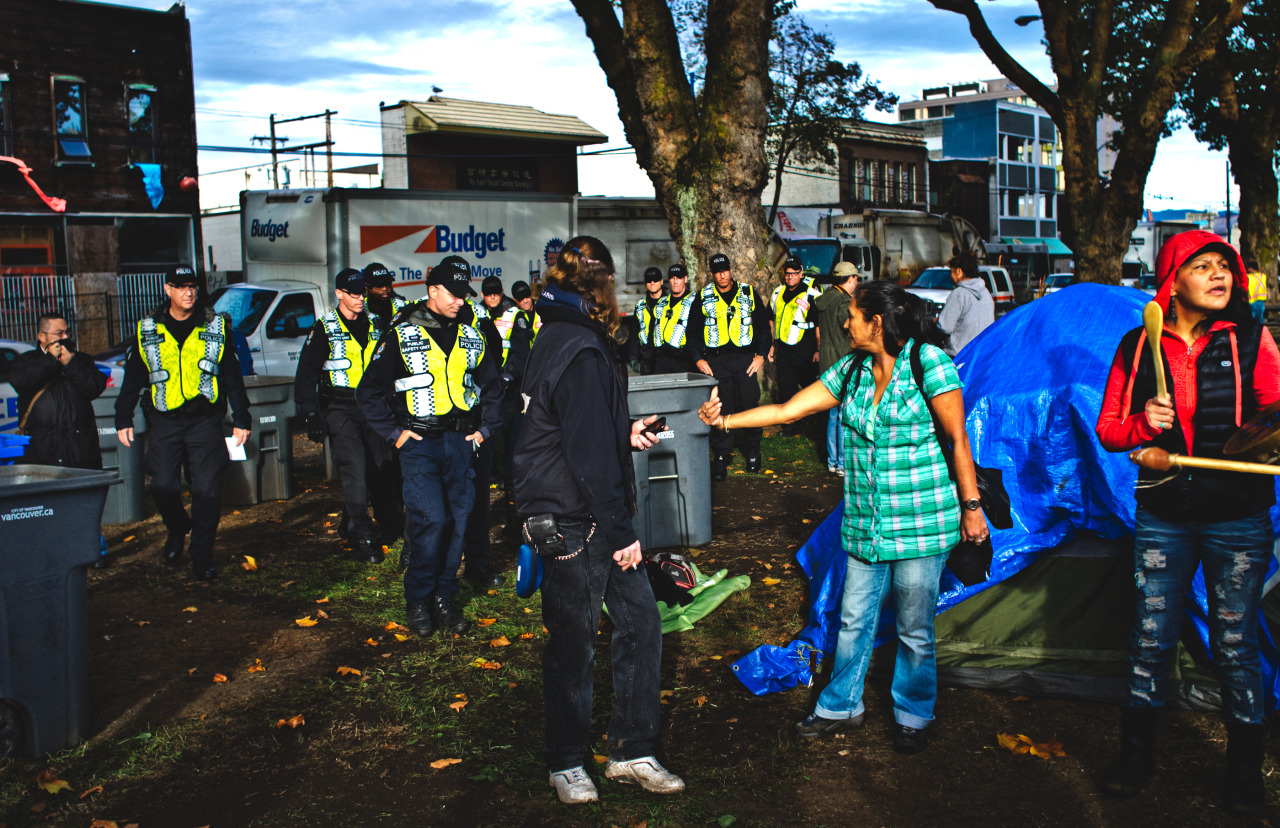It has been more than two weeks since the City of Vancouver’s decision to crack down on survival street vending on 0-400 blocks of East Hastings St. According to the City, the once-common act of selling wares on the sidewalk will no longer be tolerated, as police presence is set to increase in order to drive vendors into city-sanctioned markets.
The Downtown Eastside (DTES) community has been concerned about the new policy, claiming that the ban is a tactic to clear out street vendors and homeless people in order to make way for gentrification condominium development in the area.
On December 3rd, a “community speak-out” was held at the Carnegie Community Centre. Organizers hoped to open up dialogue and implement next steps through which to counteract the policy. Earlier that week, community groups staged a “vend-in” protest and issued an open letter to the City of Vancouver.
During a meeting on November 17th, Tobin Postma, the City of Vancouver’s Communication Manager, stated that tickets will not be issued to enforce the policy, but some community members have expressed doubt.
“The City has vowed that the movement of people off East Hastings is voluntary,” said Douglas King, a lawyer with Pivot Legal Society, “but this couldn’t be farther from the truth. Many vendors are being forced or intimidated by the police. Some have even had their possessions confiscated.”
King also stated that the Vancouver may be taken to court regarding the ban, which could be in violation of the Charter. Section 7 of the document ensures one’s “right to life,” and a large number of vendors sell goods in order to buy food and other daily necessities. Last fall, a provincial judge dismissed a similar challenge regarding the vending by-law.
Tracy Morrison, president of Western Aboriginal Harm Reduction Society, expressed that the ban hasn’t only taken a toll on vendors means of survival but has greatly impacted the community.
“I never thought I’d come out here and see a ghost town,” she said. “I used to be able to walk around and see people I know, but nobody is out anymore. They’ve completely taken away our community.”
These sentiments were echoed by an organizer of the event, Karen Ward, who noted the important social element of East Hastings St. “For many of us, the streets are the only place where we can see the people we know,” she proclaimed. “We are losing not just a place to sell to buy and sell things, but our right to freely assemble. Once we are pushed out, we are invisible. We lose our presence and voices.”
After the primary speakers, the crowd was asked to share how the ban had personally affected them. One man, who makes a humble living selling hand-made art, expressed that he can no longer afford rent because he cannot sell his wares on East Hastings St.
Another woman said that at times when she didn’t have enough money, many vendors would let her buy food on credit. She is worried that the ban will eliminate this informal safety net which has for years ensured her something to eat. Additionally, a survey of more than 50 street vendors found that the community has been gravely impacted by the new policy.
While many people asserted that pressure must be put on the City to repeal the policy, others were quick to bring up the bigger issue. “Vending is not the central point here,” said Dan Wallace, a prominent First Nations activist. “Vending is a symptom of homelessness, which is the real problem. If the City looks after its own residents, if they provide them with the necessary assistance, then people wouldn’t even had to vend in the first place.”
According to the most recent homeless count, there are currently 1,746 unhoused individuals in Vancouver, over 800 of whom live in the DTES. Seven years ago, Mayor Gregor Robertson claimed that he would end homelessness in the city by 2015.
Once the event came to a close, many attendees expressed that there is still much work to be done. Despite numerous protests, the City seems firm regarding the street vending ban. However, the community has vowed to continue to continue to place pressure on city officials and the police until the policy is lifted.
Pedro was born in the jungles of Paraguay but currently lives in Vancouver. In his spare time, he likes to eat cheesecake and release electronic music under the pseudonym LUSK.
Special thanks to Jakub Markiewicz & Maria Wallstam






